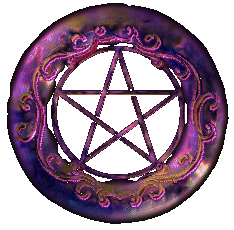
This page has the following information:
Herbs and Magic: The Basics



|
Pagans Lounge on MySpace.com  View My Guestbook Sign My Guestbook Main Page Calls and Charges Gods and Goddess 161 Laws Laws More on Laws Tools Circle Information People Sabbats Esbats Spells Divination Rituals Chants Invocations Book of Shadows Elements Stories Stones Herbs Oils Magick Laughter Corner Satanism Church of Set Glossary Grab Bag- Other Alchemy Animals Arts and Crafts Covens Days of the Week Incense Stars Quotes Trees Links About Ethereal Projections Events and Gatherings Advertisements Copyright Submit Info Contact Us |
Herbs and Magic: The Basics Basic Herbal Collection According to a recent survey conducted on several mailing lists, these herbs were considered 'essential' to a good collection: Sage - protection, immortality, wisdom Mugwort - Anti-theft, astral projection, banishing, clairvoyance, consecration, divination Rosemary - purification, wisdom, strength, remembrance, protection Chamomile - dreams, healing, love, peace, prosperity Patchouli - banishing, clairvoyance, protection Rose - anointing, balance, banishing, beauty, love Dragon's Blood - binding, changes, consecration, courage Frankincense - cleansing, consecration, divination, exorcism, inspiration, knowledge No matter what type of magical system one follows, it's a pretty good bet that at one time herbs have played a big part. Plants and their essences contain energy, which varies according to the plant that aids in achieving the result of a spell. Some plants have, through time and trial, been shown to benefit certain types of spell work. These are known as magickal herbs. Herbs have a number of different uses in magical workings. According to Celeste Moondancer, "They can be made into magickal oils, condensers and balms for anointing the body, candles, tools, gemstones, amulets and pouches etc. In loose form they can be mixed with other herbs or used by themselves as incense, dream pillows, various sachets that can be carried or used in baths for specific intentions. The seeds of some can be strung together and worn as necklaces, the flowers woven together as garlands or used to adorn altars. There's more, but you get the idea." Some herbs may also be used for different purposes. Cinnamon, for instance, is equally acceptable for spells promoting protection, success, and love. For most of the herbs, however, one or two of the connections is more powerful than others, so most magical practitioners consult an herbal reference to get a better feel for the character of the plant's energies before attempting its use. To continue the cinnamon example, it is much more effective as a draw for money, protection and success than as a love herb. Herbal books and references abound, both in print and on the Internet. In my experience, the best reference in print is Cunningham's Encyclopedia of Magical Herbs by Scott Cunningham. It includes definitions, historical data, and uses for hundreds of herbs, from Acadia to Yohimbe. Other titles include Charms, Spells & Formulas for the Making & Use of Gris-Gris Bags, Herb Candles, Doll Magick, Incenses, Oils & Powders by Ray T. Malbrough, and Herbs in Magic and Alchemy by C. L. Zalewski. Online sources include Eadon's Herbals, a fairly comprehensive guide to herbal preparations and uses by Eadon, The Enchanted Gardens of Ambrosia, a comprehensive guide to the herbs and their correspondences, and The Magickal Garden, a thorough listing of herbs with brief listings of uses. |
